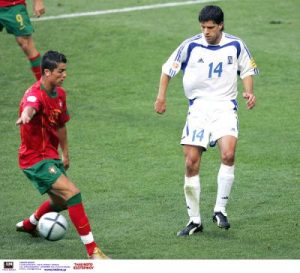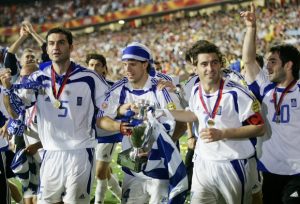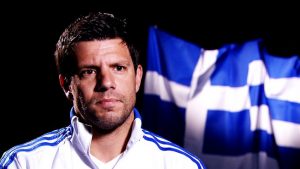“I believe in this team” – Takis Fyssas talks World Cup play-offs and Euro 2004
With Greece facing a winner-takes-all World Cup play-off against Croatia, Matt Horsman tracked down one of the stars of the country’s incredible Euro 2004 winning campaign, Takis Fyssas, to ask him about Greece’s chances this time around and what it was like to be a European Champion.
The underdog story is as old as time but it never seems to lose its appeal. In 2004 the footballing world was left stunned as lowly Greece overturned the odds to win the European Championship, beating hosts Portugal in the final.
Takis Fyssas, now the Academy Director at Panathinaikos, played in every game of that campaign, which he described as the best moment of his career.
“It was a dream just to participate in Euro 2004 after 24 years of not qualifying,” Fyssas tells me.
“For us, we had a target just to better the national team of 1980 so that happened after the first game when we beat Portugal. We did it! After that we were flying!”
As the tournament progressed, it seemed as though Fyssas and his teammates were playing without any pressure as they knew that their momentous opening victory over the hosts had already secured them hero status back in their homeland.
“Yes, it’s true! We already believed we had won because we had beaten Portugal. There was such power in our squad we lifted ourselves to keep going. We played Spain and drew against Spain then played Russia and things seemed like we could qualify. We lost this game but after the goal that we scored against them we made it to the next round anyway. Here we are! It was fantastic and we heard from Greece that all Greeks were in the road and in the streets and celebrating after every game. So for us it was a dream.”
The only game that Fyssas didn’t start was the only game Greece lost in the whole campaign, going down to Russia 2-1. Not that he mentioned this of course. For Fyssas the key to the success of that Greek side, and all the successful sides he has played for, was putting the team ahead of the individual. Fyssas was adamant that this ‘family’ culture helped them overcome their more illustrious opponents.
“In the national team of Greece, we created a family. There were many secrets to the success but especially this. If you don’t have it you cannot have success in football.
“Football is a game that too many players play so we cannot think about ourselves. Of course, sometimes some games are decided by a player doing one piece of amazing skill, but if you don’t have a family atmosphere, if you don’t sacrifice yourself for your teammates, that means that there is not a chance to have success.

“In Euro 2004 we were a team, no-one was a star, we just played for each other, we sacrificed our goals for our teammates. This is clever, if you don’t have a Cristiano Ronaldo or a Luis Figo how do you get success? Just to cover, just to be as a team, to build together. Greeks traditionally have won many battles from their mind, their soul. We had a Greek soul.”
Fyssas laughs as he recalls the reception that the team received upon returning to Greece.
“It was crazy,” he begins. “You can search on Youtube to find out what happened when we went back to Greece. It was fantastic, all of Greece was there. It was fantastic even for the country because in 2004 everybody was happy.”

So far, no Greek team has come close to matching the exploits of the 2004 vintage, and Fyssas insists this is down to the lack of the ‘family’ culture he speaks so highly of.
“In the Greek national team, for the last few years we failed to have a competitive team but first of all and more important we were not a team. We did not have a family atmosphere. There were many problems.”
Fyssas speaks with some authority on the matter having taken over as the Director of the national side when he brought his playing career to a close in 2008.
“The summer I quit football I went to Euro 2008 to see Greece. I wasn’t a member of the national team because I had retired. During Euro 2008 the Greek national team wasn’t having good results and the president proposed to me to become the Director of the team for the next season. I stayed for six seasons. We made so many successes we went to Euro 2012 and we went to the World Cup in 2010 in South Africa. It was so full of experiences and so full of football.”
After leaving his post to go back to Panathinaikos as the sporting Director, Fyssas saw the team spirit vanish from the national side, but is optimistic about the current side.
“They managed to change this and now the players have changed. They play for each other, they managed to take the second place and in terms for the playoffs we are waiting for Croatia.”
Fyssas is philosophical on the chances of smaller nations like Greece or Iceland – the smallest country to qualify for the World Cup in its history – following in the footsteps of the 2004 side and upsetting the bigger teams to win major tournaments.
“Iceland is, of course, a small country but they have heart, they have soul, they play for their country, if you see them how they celebrate, how they act inside the game, this is not usual from other teams so this is the difference. Even if you don’t have the Cristiano Ronaldo you can make the difference as a team.”
Our talk switched focus to this week’s upcoming play-off match against Greece, and Fyssas was optimistic about his country’s chances.
“It is very obvious that we have to study a lot about how Croatia play because, for sure, they are a great team with great players and in the past – even in Euros and World Cups – they have always been a very competitive team.
“It is very important to take it game by game, so do not think about the second game in Greece now, they have to focus on the first game in Croatia. We have to go there and take the result that will give us the opportunity to play 100% in the second game and take the victory.
“I believe in this team and I am sure that all Greeks wait to see a very competitive team that will give everything and then we will see the result.”

For Fyssas, the success of this Greek side isn’t dependent on qualification for next summer’s tournament. As he says, the play-offs are: “just two games, they have to work hard but anything can happen”.
In his mind, success has already been achieved by rediscovering the family element of the national side that has been missing since the triumph in 2004.
“For me, they did it already, because they managed to play again as a team like we used to and for sure they will have a future to play in the big tournaments.”